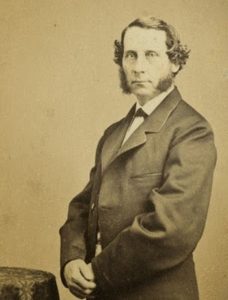
Pierce Mease Butler
*The birth of Pierce Mease Butler is affirmed on this date in 1810. He was a white-American plantation and slave owner and farmer.
Born in Philadelphia, PA., he was the grandson of Pierce Butler and changed his birth name Pierce Butler Mease to his surname Butler. During the Antebellum South, he inherited half of his grandfather's Butler Island and St. Simons Island plantations. From 1832–34, British actress Fanny Kemble and her actor/manager father, Charles Kemble, made a two-year theatrical tour of the United States. Pierce Mease Butler met her during the tour and married her on June 7, 1834. They lived in Philadelphia and had two daughters, Sarah and Frances.
Butler took his family to Georgia for the winter of 1838–39. His wife kept a journal of their brief stay on one of their plantations. In her writings, she expressed disgust at the state of life of slaves and criticized contemporary arguments for justifying slavery. The couple had increasing tensions over this and their fundamental incompatibility. When they divorced in 1849, he retained custody of their daughters. By the mid-century, Pierce Mease Butler was one of the wealthiest men in the United States, but he squandered a fortune estimated at $700,000.
He avoided bankruptcy by selling 436 slaves at Ten Broeck Racetrack outside Savannah, Georgia. It was the largest single slave auction in U.S. history and netted him more than $300,000 (equivalent to $9,047,778 in 2021). Many called it 'The Weeping Time,' national newspapers covered the auction.
He sat out the American Civil War in Philadelphia, a refuge for numerous Southerners, and was imprisoned for treason from August to September 1861. In the social and economic disruption after the war, Butler was unsuccessful in adapting to the free labor market. Amid a general agricultural depression, he could not profit from the Sea Island plantations. Pierce Mease Butler, unable to coax another redemption from his inheritance, died of malaria in 1867.
Later generations After his death, his younger daughter Frances Butler Leigh and her husband James Leigh, a minister, tried to restore productivity and operate the combined plantations but were unsuccessful in generating a profit. They left Georgia in 1877 and moved permanently to England, where Leigh had been born. Frances Butler Leigh defended her father's actions as a slaveholder in her book Ten Years on a Georgian Plantation since the war (1883), intended as a rebuttal to her mother's critique of slavery from 20 years before.
Mease Butler's elder daughter, Sarah Butler Wister, married a wealthy Philadelphia doctor, Owen Jones Wister, who lived in the city's Germantown section. Their son, Owen Wister, became a popular American novelist, best known for The Virginian, a 1902 Western novel now considered a classic. The younger Owen Wister was the last of Major Butler's descendants to inherit the plantations. He wrote about the post-Civil War South in his 1906 novel, Lady Baltimore, which romanticized "the lost aristocrats of antebellum Charleston."
Wister's friend and former Harvard classmate, President Theodore Roosevelt, wrote to him criticizing the novel for making "nearly all the devils Northerners and the angels Southerners." Pierce Butler and many of his descendants are buried in a vault in the cemetery of Christ Church, Philadelphia, built-in 1727–1744, and a National Historic Landmark. Butler Street in Madison, Wisconsin, and Pierce Butler Route in St. Paul, Minnesota, are named in his honor.